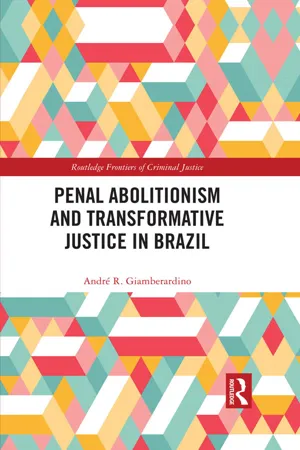
- 192 pages
- English
- ePUB (mobile friendly)
- Available on iOS & Android
Penal Abolitionism and Transformative Justice in Brazil
About This Book
Penal Abolitionism and Transformative Justice in Brazil discusses how penal abolitionism provides fundamental theoretical bases and practical references for the construction of a transformative justice in Brazil, supporting the claim that justice is a socially constructed conception and that victims do not unanimously stand for punishment.
The book explores how the active participation of the protagonists of a conflict in a face-to-face negotiation of symbolic reparation, can produce a sense of justice without the need to punish or impose suffering on anyone. Mapping the ways that restorative justice in Brazil has distanced itself from the potential of transformative justice, to the extent that it fails to politicize the conflict and give voice to victims, the book shows how it has resulted in becoming just a new version of penal alternatives with correctionalist content. Moving away from traditional criminal justice language and also from conservative approaches to restorative justice, the author argues that the communicative potential of the transformative kind of redress can be dissociated from the unproved assumption that legal punishment is essential or even likely to achieve justice or deterrence. The arguments are grounded in the Brazilian reality, where life is marked by deep social inequalities and a high level of police violence. By providing a review of the literature on restorative justice, transformative justice, and abolitionism, the book contextualizes the abolitionist debate in Brazil and its history in the 19th century.
Penal Abolitionism and Transformative Justice in Brazil is important reading for students and scholars who study punishment and penal abolitionism, to think about what it is possible to do in societies so deeply marked by social injustice and a history of oppression.
Frequently asked questions
Information
Table of contents
- Cover
- Half Title
- Series Page
- Title Page
- Copyright Page
- Dedication
- Table of Contents
- Acknowledgments
- Introduction
- 1 There is no rationale for punishment
- 2 From restorative to transformative justice: Abolitionist tenets and criteria
- 3 “I just want justice to be done”
- 4 Social control and transformative justice: A theoretical proposal toward a foundation for accountability
- 5 Transformative justice as a new political alphabet for Brazil
- Conclusions
- Appendix
- Index